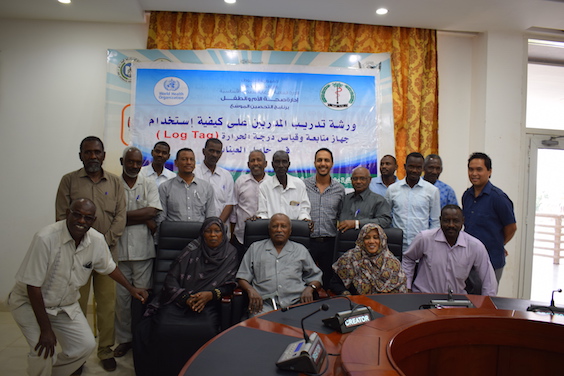
Jaouad Tilout (8th from right) with the workshop participants at the logtag training event (Photo: Jaouad Tilout/WHO)
14 September, 2017 - On 12 and 13 September, 20 Acute Flaccid Paralysis surveillance officers from 10 of Sudan’s state health facilities joined a workshop in Khartoum to learn about so-called ‘logtags’ and reverse cold chain management, in the opening moves of a study that will benefit the fight against polio and other diseases across the region.
WHO Sudan spoke with facilitator Jaouad Tilout (40), who works as Information Managemnet Officer with WHO’s Regional Office’s Polio Eradication Programme, to understand why this workshop is so important.
Hi Jaouad! ‘Logtag’, ‘reverse cold chain’: sounds complicated! Can you explain?
“Sure! It’s really pretty simple. Firstly, a logtag is simply a small device that tracks the temperature of stool samples that are being sent from the field to the national polio lab. Secondly, a cold chain is what you call the transport chain that goes from a lab to the field. For example, vaccines must be kept at a certain temperature from the moment they are produced, until they are administered. Stool samples that need to be tested must also be kept at a certain temperature. But because the direction is reversed and they go from the field to the lab, it’s called reverse cold chain.”
How cold is the reverse cold chain, and why?
“Polio stool samples have to be kept at a constant temperature of 8 degrees Celsius to minus 2 degrees, or the traces of the disease will die. So ironically, in this case we are actively trying to keep a virus alive. Sudan is currently polio free, so we look at various other pathogens that cause acute flaccid paralysis as well.
Isn’t that dangerous for the transporters?
“No, the stool samples are packed securely in sealed carriers. Even if the transport truck crashes, there are also calamity guidelines to manage the risk.”
Why are you adding the logtags to the carriers?
“In Sudan, health officials are quite familiar with reverse cold chain management. They have been sending samples on a regular basis and training levels are quite high. However, in other countries in the region, like Somalia, or Yemen, there are more problems with getting good samples to the lab. By adding logtags, we’re hoping to learn in more detail what is going well and what could go even better in Sudan. Once we know, we can apply the lessons in other countries too.”





